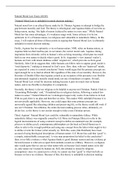Natural Moral Law Essay (40/40)
“Natural Moral Law is unhelpful in moral decision making.”
Natural moral law is an ethical theory made by St. Thomas Aquinas in attempt to bridge the
gap between morality and God. The theory is teleological, and Aquinas thinks of our telos as
being reason, saying, “the light of reason is placed by nature in every man.” While Natural
Moral law has some advantages, it’s weakness range wide. Some criticise it to be too
optimistic in it’s of human nature, too religious and vulnerable to naturalistic fallacy. In this
essay, I will explore all three of these points in arguing that Natural Moral Law is ultimately
unhelpful in moral decision making.
Firstly, Aquinas has too optimistic a vie on human nature. NML relies on human nature, as
Aquinas believes that God has put, in our nature, the correct moral code. Aquinas, taking
inspiration from Aristotle, refers to human’s telos as being reasoning, which puts too much
faith in our own nature to decide what is good. In St. Augustine’s view (named ‘realist’),
humans are born with innate darkness called ‘original sin’, which prevents us from good.
Similarly, John Calvin suggests that, while humans can follow rules to appear good, inside is
“total depravity,” making us immoral in God’s eyes. How, then, with our “depraved” minds,
are expected to come to a moral conclusion? Some would argue that the primary precepts are
rigid enough for us to lead an ethical life regardless of the state of our morality. However, the
Doctrine of Double Effect that Aquinas coined as an exception of the precepts is too flexible
and ultimately required a morally sound mind, not one of murderers or rapists. Overall,
Natural Moral Law is bad for decision making because it puts too much trust in human
nature, and is too flexible to discipline it’s complexity.
Secondly, the theory is far too religious to be helpful to anyone not Christian. Patrick Clark in
‘Examining Philosophy’ said, “if mankind has no religious destiny, following a natural law
makes no sense.” Natural Moral Law’s teleological aspect only works if one believes in God.
With no god, there is no plan and therefore no telos. This makes NML unhelpful because it is
not universally applicable. However, one could argue that some primary precepts are
universally agreed like educating children and preserving life, so the theory could still work if
one isn’t Christian. Nevertheless, the entire decision making process relies, ultimately, on
divine law, so the theory is not secular enough to help a non-Christian person.
Third, Aquinas’ Natural Moral Law could be vulnerable to naturalistic fallacy. While
naturalistic fallacy was originally coined by G.E More (in Principa Ethica) to refer to the
logical inconsistencies of using a natural concept to define an unnatural one (for example,
pleasure to define good), contemporary philosophers as (far back as David Hume) use it
often to refer to the is/ought problem and using any concept from the latter (what ought to be)
to define or term the former (what actually is). With this, some (like Bentham) have been
accused of using theological descriptions of human nature. G.E Moore has said that “good” is
a simple, indescribable concept and, “a wise man proportions his belief to the conclusion”-
there is too little evidence o what Aquinas thinks is good (human reason) and any evidence pt
forward (reason is what sets us apart form animals) counts as a fallacy. However, a religious
take would agree that we can use what nature tells us because God created nature as he did
us, only nature isn’t ruined by human sin. Still, this rebuttal is reined by religious
assumptions- since we cannot prove a God, we cannot say that “good” is what God tells us
because we have no evidence. Because of this, this theory is unhelpful in decision making




